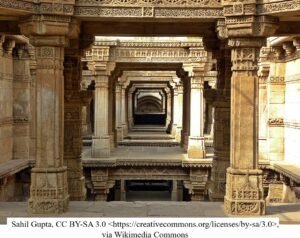Kabeerdaas ji is categorized as a saint but his thoughts and compositions are not confined to religion, spirituality, meditation and bhajans alone. He also deals with worldly life – the character and behaviour of individuals; practices (and malpractices) rampant in society; evils of caste system which divides people into ‘high’ and ‘low’ classes, etc. He also goes in depth in denouncing superstitions and hypocrisy prevalent in practice of religions and sects in general. He considers them as obstructions in the way of health, peace and happiness of society. We should take all these things into account if we want to understand and interpret Kabeer’s poetry correctly.
— Kusum Banthia
अति का भला न बोलना, अति की भली न चूप ।
अति का भला न बरसना, अति की भली न धूप ।।
Ati kaa bhalaa na bolanaa, ati kii bhalii na choop
Ati kaa bhall na barasanaa, ati kii bhalii na dhoop
In this couplet Kabeer stresses the need for balance in life and personal behaviour. To take an example, rain and sunshine are both pleasant in themselves and really beneficial for the world. But beyond a limit, they become unpleasant and even harmful. Similarly, being extremely loquacious or extremely quiet puts our lives off balance. A talkative person loses his sense of balance and sometimes, his unnecessary and inappropriate blabber proves harmful for his surroundings and the society in general. On the other hand, a person keeping silent all the time gets cut off from others and is not able to raise his voice and speak up even when it is urgently required for the health of society.
Kabeer here pleads for moderation and balance in the life of a person, and by implication, in the social system.

जहाँ काम तहाँ नाम नहिं, नाम नही वहँ काम ।
दोनों कबहुँ नहीं मिलैं, रवि रजनी एक धाम ।।
Jahaan kaam tahaaan naam nahin, naam nahin vah kaam
Donon kabahun nahin milain, ravi rajanii ek dhaam
To understand this couplet properly, we must first understand the meaning of the words ‘Kaam’ (काम) and ‘Naam’ (नाम). ‘Kaam’ means desire for worldly pleasures; ‘Naam’ means the name of God and also its constant chant (also called ‘sumiran’).
Kabeer believes that thinking of God, chanting his name and meditating with one’s mind fixed on the Supreme being are the required spiritual practices which lead a human soul to liberation (Moksha). But this can be possible only when one shuns worldly desires. If his mind hankers after material pleasures, he will never be able to devote it completely to meditation of Brahman. Similarly, if he does not practice such meditation, his empty mind will be invaded by desires. Coexistence of desires and meditation in the same time-frame is as impossible as the coexistence of sun and night at the same time.

-
Thus Spake Kabeer 01
Kabeerdaas ji is categorized as a saint but his thoughts and compositions are not confined to religion, spirituality, meditation and bhajans alone. He also deals with worldly life – the character and behaviour of individuals; practices (and malpractices) rampant in society; evils of caste system which divides people into ‘high’ and ‘low’ classes, etc. He…
-
Thus Spake Kabeer 02
Kabeerdaas ji is categorized as a saint but his thoughts and compositions are not confined to religion, spirituality, meditation and bhajans alone. He also deals with worldly life – the character and behaviour of individuals; practices (and malpractices) rampant in society; evils of caste system which divides people into ‘high’ and ‘low’ classes, etc. He…
-
Thus Spake Kabeer 03
Kabeerdaas ji is categorized as a saint but his thoughts and compositions are not confined to religion, spirituality, meditation and bhajans alone. He also deals with worldly life – the character and behaviour of individuals; practices (and malpractices) rampant in society; evils of caste system which divides people into ‘high’ and ‘low’ classes, etc. He…


